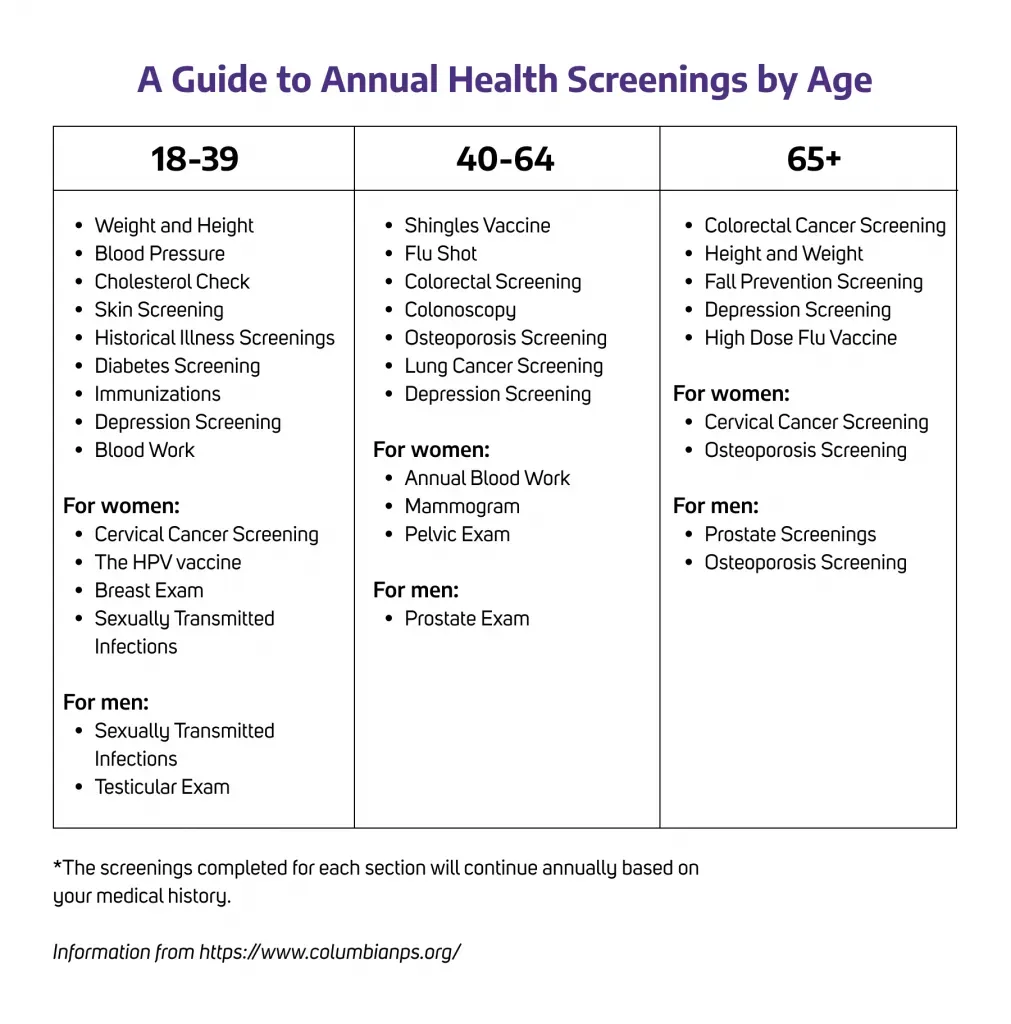Adult preventive health screenings are a cornerstone of proactive care that helps you stay ahead of illness by catching problems early while you maintain energy, independence, and lasting vitality in the years ahead. When you make wellness checks for adults part of your routine, you gain clarity about risk factors and actionable steps, turning health into a confident, ongoing plan rather than a reactive response to symptoms or surprises. Our guide brings together key health screenings for adults with practical timelines, so you know when to seek screening, what tests to expect, how to prepare, how results translate into personalized lifestyle choices, and how these decisions fit your broader life plans. Following preventive care guidelines for adults helps ensure you receive a balanced, evidence-based set of tests that minimize risk, optimize early detection, and reduce unnecessary procedures while supporting your overall quality of life over time with periodic reviews and adjustments as your health changes. In addition, embracing annual health screenings for adults supports a sustainable health rhythm that fits real life, encourages proactive discussions with care teams, and keeps you aligned with long-term wellness goals, personal values, and supportive habits like sleep quality, stress management, and community resources.
From an alternate perspective, these ideas translate into preventive medical evaluations and routine health checks that empower you to manage risk before symptoms appear. Discussing health screenings for adults becomes a conversation about early detection, personalized risk assessment, and evidence-based care tailored to your age, lifestyle, and family history. By weaving related terms such as wellness assessments, risk screenings, and preventive care routines into your plan, you create a searchable, user-friendly narrative that resonates with readers seeking practical health guidance.
Adult Preventive Health Screenings: Wellness Checks and Key Screenings for Lifelong Wellness
Preventive health screenings are the proactive backbone of modern medicine. By weaving wellness checks for adults into your yearly routine, you can identify risk factors and early problems before symptoms appear. This approach supports longer, healthier living and complements immunizations and lifestyle changes. It also aligns with adult preventive health screenings as a concept, helping you stay ahead of illness rather than simply reacting to symptoms.
To stay organized, focus on the essential set of tests and assessments that apply to your age and risk. This is where terms like key health screenings for adults and annual health screenings for adults come into play, helping you prioritize tasks while your clinician uses preventive care guidelines for adults to tailor a plan. Together, these elements keep you informed, protected, and engaged in your own health.
Tailoring Preventive Care Guidelines for Adults: Age, Risk, and Annual Health Screenings
No two adults are exactly alike, and preventive care guidelines for adults reflect this. Your age, sex, medical history, and risk factors determine which screenings you should receive and how often. For example, colorectal and breast cancer screenings, cervical cancer checks where appropriate, prostate health discussions, bone density tests as you age, and vision and hearing checks may all be considered depending on your profile. When you customize the plan, you maximize benefit and minimize unnecessary testing, ensuring care remains relevant and efficient.
Creating your personalized schedule is a collaborative effort with your clinician. Start by listing medications, family history, and lifestyle factors, then map out the recommended annual health screenings for adults while building in flexibility for aging and new risks. This approach makes wellness checks feel manageable and aligns with the goal of preventive care guidelines for adults, helping you stay healthier with less stress and better outcomes.
Frequently Asked Questions
What are adult preventive health screenings, and how do wellness checks for adults fit into my overall health plan?
Adult preventive health screenings are a set of tests and assessments designed to detect health problems before symptoms appear. They’re the backbone of wellness checks for adults, helping you catch risk factors early and guide timely treatment. Common examples include checking blood pressure, ordering lipid panels and HbA1c, screening for cancers ( colorectal, breast, cervical where appropriate ), ensuring up-to-date immunizations, and assessing bone health, vision, hearing, and mental well-being. The exact screenings you need depend on age, sex, family history, and risk factors, and are guided by preventive care guidelines for adults to tailor recommendations rather than a one-size-fits-all plan. Work with your clinician to build a practical, personalized schedule you can follow at your next annual health screenings for adults.
Which key health screenings for adults should I prioritize, and how do preventive care guidelines for adults inform my annual health screenings for adults?
Key health screenings for adults should be prioritized by age, sex, and risk. Preventive care guidelines for adults help decide which tests to schedule and when. Generally, you should have blood pressure checked annually, a lipid panel every 4–6 years (more often if risk factors exist), and diabetes screening if you’re overweight or have other risks. Cancer screenings are age- and gender-specific (colorectal screening starting mid-adulthood; breast, cervical, or skin cancer checks as appropriate). Immunizations, bone health, vision, hearing, and routine mental health screening are also important while considering risk. Your clinician can translate these guidelines into an annual health screenings plan for adults that fits your age and personal risk.
| Aspect | Key Points | Why It Matters |
|---|---|---|
| Purpose of preventive health screenings | Proactive care to catch problems early, maintain wellness; detect risk factors; reduce emergencies and advanced disease | Leads to better outcomes and long-term cost savings |
| Scope of wellness checks for adults | Blood tests, imaging, physical exams, mental health questionnaires; tailored by age, sex, history, and risk factors | Ensures comprehensive, personalized plan rather than one-size-fits-all |
| Key screenings and timing (practical guide) | Blood pressure annually; lipid panel every 4–6 years; diabetes screening for risk; cancer screenings by age/gender; vaccines; bone health; vision/hearing; mental health screening | Provides a practical, actionable schedule to stay on track |
| Tailoring to age, sex, and risk | Differences by gender and age; women may have reproductive/breast screenings; men may discuss prostate health; older adults may need more frequent cancer/bone/cognitive assessments | Maximizes relevance and effectiveness of preventive care |
| Preparation for screenings | Bring medications/supplements; note family history; discuss lifestyle factors; check fasting requirements; understand normal results; confirm costs | Improves accuracy and informed decisions |
| Interpreting results and taking action | Normal results lead to routine follow-up; abnormal results require further tests or early treatment; ask questions and clarify next steps | Guides appropriate actions and reduces anxiety |
| Lifestyle and preventive care | Healthy eating, physical activity, weight management, sleep, stress management, avoid tobacco; lifestyle changes complement screenings | Enhances screening outcomes and ongoing health |
| Barriers and overcoming them | Time, cost, fear, confusing guidelines; overcome by preventive visits, prioritizing impactful screenings, community resources | Improves access and adherence to preventive care |
| Evolving guidelines | Guidelines update risk calculators, cancer screenings, vaccines; stay informed and discuss changes with clinician | Keeps plans current with latest evidence |


